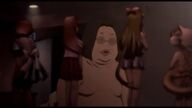At first glance, 13 words are not long, but they are very rich. Abundant and a little messy at the same time. The first four episodes are prelude to four separate stories of people struggling to get out of the pressure, when a baseball teenager hits them in the head and helps them escape as a matter of course. The fifth episode began to try to decipher. At this time, the perspective was only on the case of the "sap monster", but Jin Min's specialty of shuttle between reality and fantasy began to play, and the metaphors began to appear one by one. In episodes 6 and 7, the two officers went deeper, got frustrated, and entered the state of the first four—and at the same time, we vaguely felt that this is the state that is common in today's era. From the eighth episode, it seems a little unclear, but in fact it is Jin Min who is spreading the topic, the eighth episode is about life and death, and the ninth episode is some absurd stories with no way out (even in this episode Jin Min conceived And the layout is also very, very clever), the tenth episode talks about the loss of humanity when people treat people (again, it is a very clever and very Jin Min's narrative method), and the eleventh episode finally someone came to have a head-to-head anal with the baseball boy and the anal won, and finally Two episodes come to an end, revealing the truth about Baseball Boys and Marumee, where everyone and everything ties together.
By the middle of the audience, it is already clear that the baseball boy is actually the delusion of all the victims. They themselves are murderers who put themselves in a desperate situation, but they all assume the attitude of victims, paralyzing themselves with "it's not my fault", and push all crimes to a virtual image that does not exist. And as a delusional existence, Malume has always been cute and amiable. It has been saying in the confinement and in everyone's ears: You are not wrong. it does not matter. I will protect you. It was only in the end that I suddenly understood: In fact, Malume is no better than the baseball boy.
And what is the difference between the two delusions of Malume and Baseball Boy?
The initiator of everything and the first victim, Yuezi, had created these two images when she was a child. Marumee is the dog she raised when she was a child. One day, she accidentally loosened Marumee's rope, causing it to be accidentally killed by a car. In order to cover up the truth, Yuezi lied to her father that the real murderer was a skater who was wearing skates. Teenager in shoes holding a bat.
Yuezi's model of "getting out of guilt" for himself is actually the pattern in which all those who pretend to be victims get off their guilt.
"Ma Lumei" represents the beautiful things that she has not been able to protect. Yuezi forgives herself for Ma Lumei, but she still can't accept the reality that beautiful things are destroyed by herself, so she creates the image of Ma Lumei later, and In her delusion, Malume kept saying to herself that I don't blame you, you are right, and I will protect you. This is actually the guilt in Yuezi's heart, and she needs an existence who can say "you are right" to herself. If this existence was Malume, who was unfortunately killed at the beginning, it would certainly be the most convincing to her. This delusion is like a gentle town. It needs to be warm, cute and likable, giving people enough comfort and comfort to achieve the effect of paralyzing people.
And Baseball Boy, like Yue Zi's original lie, is a scam that bears all the crimes. No matter what setbacks he encounters, he will paralyze himself "I am not at fault" for the first time, and then blame all the blame on others. This image is the baseball boy. From the first four episodes, it can be seen that there is no doubt that the excuse of Baseball Junior is quite useful. This approach is quite reckless, and is always just avoiding the problem, and it is impossible to solve it completely. All of our poor clients understand this, so the image of the baseball boy is quite violent and destructive - the more violent it appears on the surface, the more brittle it is and the less trouble-free it is.
Both are monsters of the times. But at the same time, no matter how powerful it is, it is still a scam.
"Escape" is the key word throughout, and it is also the seemingly omnipotent key that emerged under the enormous pressure of modern society, and it is also the source of the creation of these two monsters. Illustrators who can't complete their work tasks, governesses who can't escape their double life, housewives who can't even fit in with their peers, doctors who make big mistakes but don't want to face the consequences... Everyone is running away from real and effective solutions, pray It doesn't matter if someone from heaven appears to help you get out of the sea of misery - it doesn't even matter if it is so simple and rude that you smother yourself, or even hurt yourself.
This is the way everyone in modern society is vaguely preparing for themselves, and Jin Min has made it a little more specific. From the eighth episode, it seems to be off-line and unclear, but it is actually an interpretation of this word and this behavior.
The eighth episode is about life and death - in fact, the ultimate choice to escape is not to die. It was a sweet-sounding episode, and I found it very, very ironic. Here is the explanation of Jin Min himself, who is eager to carry the bullet screen at station B: menarche girl, old man, and homosexuality, this is a combination that will not give birth to anything. The final condom ad, "The Cheerful Family Project," is the climax of irony. There will be no hope after death, just wandering the world to get a little fun by making fun of passersby, and nothing will be born after death. Escape is the most hopeless.
The ninth episode is also a group portrait. Compared with the first four episodes, the true face of the baseball boy is a little clearer - he is a delusion, a hypocritical sigh after hearsay, a twisted excuse, a simple and rude solution, yes The reward that the wicked deserve is to receive all the "unbelievable" and "unimaginable" black holes. After all, he is not a real thing.
Episode 10 is something even worse than escape. The villain doesn't feel that he is evil, but instead relies on Malume to believe that he has nothing wrong. Except for the protagonist of this episode, in fact, everyone from the animation production team to the TV station is indifferent and inhuman. And the worst person gets the finished product made by the animation team - it's like a food chain, and the most murderous person stands at the top. And everyone was "cured" by Malomei. In this episode, Marume's image has begun to collapse, and it looks very scary. It is no longer a mascot-like existence to comfort everyone, but a hypocritical and hypocritical savior.
In the eleventh episode, a character who is directly entangled with the baseball boy finally appeared. And very sadly, she appeared mentally abnormal in the eyes of her husband. The entire episode is her monologue to Baseball Junior, interspersed with the reactions of her husband, one of the cops involved in Baseball Junior. The family formed by these two people has no "home" appearance anymore: the wife has a heavy sense of guilt and guilt, desperately trying to pay for her husband, and the husband is emotionally exhausted and often returns late under the pretext of work. In fact, the husband finally chose to escape, comforting himself that he was frustrated at work, "it's not my fault, it's because the times have changed", while the wife has always bravely faced all the negative emotions in her heart. Selfishly, I feel sorry for the couple. In the end, although the wife changed her husband to face reality, it was at the expense of her own life. If her illness can be cured, I believe she will live a happier life later.
The last two episodes are declassified. Two detectives plus Yuezi, the three protagonists, and their wives as support, fight against the delusions sweeping Tokyo. Just as individuals go to a dead end and choose to explode and self-destruct, Tokyo is also slowly accumulating individual despair and heading for a large-scale collapse. Here is the metaphor of the fifth episode (in fact, I think it is to imply that the young criminal policeman, like the old man in the hospital, has become a so-called "mentally abnormal"), during the battle, Yuezi accepted the real memory and picked up the bloody Malomei , The middle-aged criminal policeman no longer deceived himself and took the initiative to shatter the "ideal era" that Malume created for him, and they worked together to defeat the delusion.
Not all were happy, however. The ending is exactly the same as the beginning, with people complaining and distraught in the sultry Tokyo streets. The young detective replaced the white-haired old man and waited for the jihadist, and the new cute image replaced Malume and continued to heal people's hearts. People need delusions, and at the same time they need to be destroyed by delusions, they need to be confronted, and they need to be answered. Everything goes on and on, the stress and despair of modern society continue, and "escape" is still the best way out. Delusion will still come forward when necessary, destroying individuals and destroying Tokyo, and then begging the ears and eyes of a few people to be reborn.
View more about Paranoia Agent reviews











